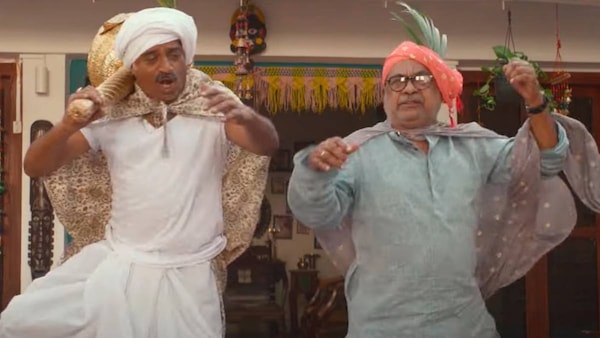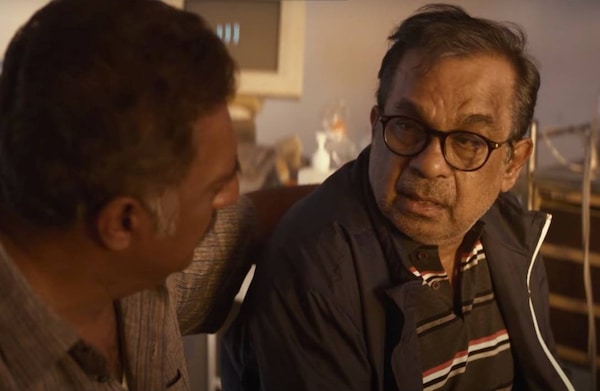Candid Review | Ranga Maarthaanda: Prakash Raj, Brahmanandam deliver a spellbinding performance
In Ranga Maarthaanda, Prakash Raj and Brahmanandam give a masterclass in acting.

Last Updated: 11.31 PM, Apr 14, 2023
In Ranga Maarthaanda, a decorated thespian, who is considered legendary among the stage actors, believes that he could ride off into the sunset and live the remainder of his life basking in all the success, fortune and fame he gathered all his life. He was naive.
Early in Ranga Maarthaanda, Raghava Rao, a wonderful Prakash Raj — the legendary thespian — is felicitated for all his unparalleled contributions to the dramatic arts. He's honoured with a gold bracelet, which becomes the symbol of all his achievements in his life. Following that Raghava delivers a rousing speech about his life in art and the sacrifices of his better half, Raju, played by a beautiful Ramya Krishnan. And he ends his speech by suggesting it's always better to quit while one's head and, like a good play, leave the audience wanting more. But, what he didn't count is that in his retirement life, he would be forced to face the consequences of all the mistakes he did in his personal life. It comes to a point where he is forced to pledge the gold bracelet, which was a symbol of his pride — never to be redeemed. His little indiscretions and acts of negligence towards his loved ones over the years as piled up so much that it becomes impossible for Raghava to redeem himself. Raghava's dream to spend his retirement with the gains of his professional success is destroyed by, let's call it, karma.
By face value, Raghava Rao seems like a totally good man. He is gifted with a savant-like knowledge of great literary works from around the world. He knows by heart the complex lines from Shakespeare's classic dramas. He's aware of the great literary works in India. He's a treasure trove of flok songs and art forms. He's undoubtedly a treasure to behold. But, in his personal life, in his own ways, he has been cruel to his dutiful and loyal wife, Raju.
Raghava is aware of that. He knows that he has not behaved in a way that values and respects Raju's unconditional and undying devotion towards him. Raju is the product of a bygone generation. Her world begins and ends with Raghava. And there is nothing that Raghava could do that would drive her away from him. Raghava well aware of this fact takes advantage of her loyalty. While we don't get a detailed account of the adultery committed by Raghava, there are enough clues to suggest that there were a lot of affairs. Raghava might have thought that he could make up for all the dishonesty he has shown to his wife in his retirement. Oh, boy was he wrong.
In his retirement, Raghava learns his acting talent is of little use when it comes to handling real-life challenges at home. When dealing with his children, he can't be a character from Shakespeare's drama. He needs to himself. And for that, he has to face the reality. And the reality is, the moment he bowed out from the stage, he was nobody. He is an empty shell of a man, who filled his inner void with great literary creations and never had the opportunity to find and get acquainted with his own self. And it seems, only his wife remembers and values him for the man he was. The world around him is moving fast and his achievements are falling into oblivion.
Stage by stage, scene by scene, the reality of life catches up to Raghava. And his mind spirals out of control at the same auditorium, which housed the happiest moments of his life. But, like his life, the auditorium also now stands gutted and chared in fire — a reflection of the greyish hellscape that is his life.
Raghava's suffering is identical to his close friend Chakrapani, played by a magnificent Brahmanandam. Raghava and Chakrapani are the two peas in a pod. They both are equally excellent at acting. However, Raghava's life is much better with all the riches. Raghava has more wealth and family members than Chakrapani. Chakrapani and his wife Subhadra (Jayalalita) are childless. Even though it's because of his infertility, his wife Subhadra bears the brunt of society. And to protect his masculine pride, Chakrapani lets Subhadra suffer. He also makes a grave error in his judgement and believes that life will give him enough opportunities to redeem himself as a husband. And his life ends up in a desolate place akin to Raghava.
Chakrapani's dramatic exit is marked by an explosive, hair-raising performance by Brahmanandam. In the final act, moments before the curtain call, Chakrapani and Raghava enact a scene from one of the many versions of The Mahabharata, where Duryodhana meets dying Karna on the battlefield. The scene beautifully portrays the deep bond of friendship between Chakrapani and Raghava. They share a heartfelt conversation, expressing their love and appreciation for each other without delay or hesitation, recognising the fleeting nature of time and the importance of seizing the moment. Their genuine connection is palpable.

Brahmanandam is an iconic comedian. In Ranga Maarthaanda, director Krishna Vamsi has cast him against the grain. And Brahmanandam performs Chakrapani with a great vengeance as if he's raging against the film industry that had limited his talents only to the realms of comedy.
Ranga Maarthaanda is a fantastic piece of drama that truly honours its genre. And it is the best work in director Krishna Vamsi's filmography.
Ranga Maarthaanda is streaming on Amazon Prime Video.

 Premium
Premium